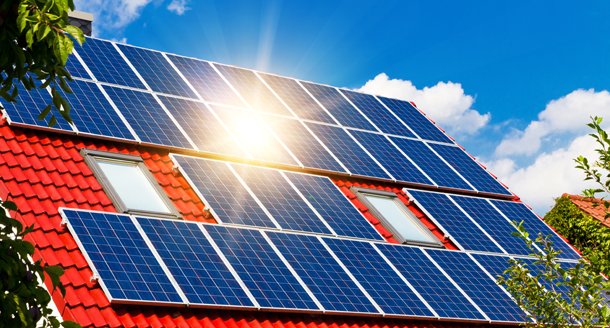Khyber Pakhtunkhwa Economic Zones Development and Management Company (KP-EZDMC), a subsidiary of the KP government, is going to shift all economic zones to solar energy.
The initiative is the first of its kind and initially, three economic zones would be shifted on solar energy and in the next phase all economic zones would be shifted on solar energy.
The decision is being implemented under the Green Khyber Pakhtunkhwa initiative of the provincial government.
KP-EZDMC Chief Executive Officer (CEO) Javed Iqbal Khattak said that under the initiative, about 30 acres land is being allocated in the selected economic zones on which solar energy generating plants of 10megawatt each would be installed in the selected economic zones.
In future, the capacity of the solar energy plants would be further up-graded to cater the energy demands of the industrial units. He said that KP is the first province, which will launch such a green energy project.
The initiative has been adopted on priority basis and the provincial government is highly serious in its implementation.
In this connection the company has already signed a memorandum of understanding (MoU) with an international consortium. The project would be operated on public-private partnership (PPP) mode.
Under the initiative, he said that the company is installing10 megawatt solar energy plants in three economic zones. These plants would be installed in Bannu, Jalozai and Karak Economic Zones. The energy generated by the solar plants would be provided to enterprises operating inside these zones.
The initiative will help in provision of several benefits and the top one is making the local industry competitive. He said that the provision of cheap electricity will definitely decrease the cost of production of products manufactured by the local units.
The company through such initiatives, he said will ensure early provision of energy to the industries as the local power distribution company is not on the same pace, on which they want to provide electricity to industries.
For the purpose, the company has also started work on the establishment of a separate power distribution company to provide electricity to industries with the cost of only Rs.9 to 10, which is manifold lower than the existing power tariff.
He said that energy is the main factor of the industrial sector, which determines the cost of production. Cutting the cost of production will make domestic industries competitive against other countries. Besides attracting domestic and foreign investors to the province, these endures will also help provide environment-friendly green energy to industries.





GOP should allow high salaried persons earning,say USD 500000 plus,in Pakistan to INVEST in Solar,as
Individuals,but in the form of an ENTERPRISE OR A BUSINESS.Then the Solar PV or Heater/Dryer project etc., can
qualify for accelerated depreciation,or 100% depreciation,in the 1st year
Since the power generation in the 1st year,will be less than the depreciation,there will be a tax assessed loss – which can be set off against the salary,to reduce the tax on salary,or get TDS refund.
There will be at least 10000 people in the Top 5 cities of Pakistan (by popilation),above that threshold (as the people in senior management in all large listed companies,will have a C2C,well in excess of that number)
To ensure that the direct tax revenue does not dry up – the depreciation set off,can be limited to 20% of the taxable income,and the rest can be carried forward,for 5 years.
The certification process is easy,in terms of installation certificates,photos and power generation records – so at year end,GOP will know how much power was generated,how much RFO and Gas was saved – Peak and Non Peak periods,and thus,the USD saved
The salary earner can enter into an MOU with a Solar developer to maintain,secure and manage the solar sites
Also,the GOP can allow such salaried people to invest as BOI (Body of Individuals) in larger solar projects,so that the business loss of the BOI can be allocated and apportioned to each individual,and the carried forward for 5 years
In theory there should be NO LIMIT to offset the tax losses with salary – as the man is taking a technical risk on the project,and each such person,will do an independent appraisal of the SPV,and that will,by itself make the solar tech more popular and viable.
OR
Solar developers should develop several SPV projects in 1 SPV,and then the tax assessed loss,can be converted into DIVISIBLE TAX CERTIFICATES, WITH A PAR VALUE OF THE ASSESSED LOSS – BUT WHICH ARE TRADEABLE – AND WHICH CAN BE SOLD TO THE HIGH SALARY EARNERS,AT A DISCOUNT,TO OFFSET THE TAX ON THEIR SALARY INCOMES.THAT WAY,THE CAN IS CARRIED BY THE SOLAR DEVELOPER,WHO HAS THE TECH AND MANAGERIAL EXPERTISE,TO RUN THE SPV PROJECT
Solar battery packs on rent,to retail households,in prime cities,facing 4-5 hours of power cuuts,or Mom and Pop stores,which need to power 2-3 LEDs and 1 Fan – are no brainers – as well as,mobile solar chargers in areas, where there is no Grid (to charge phones or play govtt ads and campaigns etc.).Even POS machines and Bill printing and low end printers,in retail kioks,can run on solar battery packs (besides laptops and desktops)
SPV lanterns and Pumps in offgrid areas,with poverty,stitched with WB/ADB/DANIA/SDA/OECF/KFW/GTZ subsidies and grants,can revolutionise life in those areas (and the solar lanterns can have the photo of the Qaid or Iqbal)
Once the solar capacity has scale – the Chinese SPV module maker,will “Make in Pakistan”,and just import the Polysilicon.
And then,in stage 3,SEZ in Pakistan will have Chinese exporting the SPv Modules (to Afghanistan and Iran – for starters).Iran has to export every drop of oil in USD and then swap that into Yuan or Gold and make power from captive (coal) or free sources (solar).Russia has shown the world that a Trillion USD of FX reserves – can be worthless in 1 second,at the click of a button.dindooohindoo